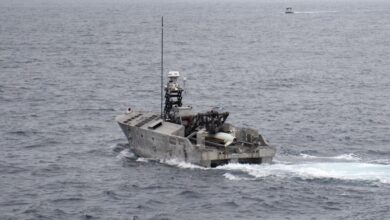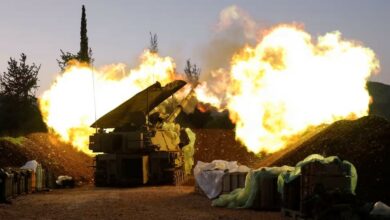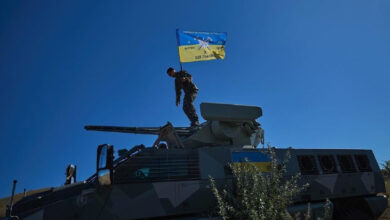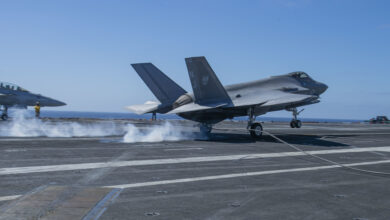Three Irish soldiers received minor injuries when an improvised explosive device exploded near their convoy in eastern Mali on Tuesday, February 25, the Irish Defence Forces said.
“While conducting a Patrol east of their base in Gao, three of our soldiers sustained minor injuries when an Improvised Explosive Device (IED) exploded close to their convoy,” the release said, adding that the three Irish soldiers “received medical treatment and are safe and well.”
“The Defence Forces conducts intensive pre-deployment mission training in order to prepare our personnel for such an incident,” it said.
Update February 25 Kibaru reported that an armored vehicle in which the Irish soldiers were travelling was struck by the IED around 20 km from Gao on the road to Kidal.
Germany’s armed forces said the incident occurred about 80 km northeast of Gao.
“A German vehicle with Irish markings and Irish crew was damaged and three Irish soldiers were slightly injured,” the Bundeswehr said in a release, adding that the injured were taken to the German medical facility in Gao by Romanian helicopter.
The Irish soldiers are part of a contingent of troops from the elite Army Ranger Wing special operations forces deployed to the roughly 13,000-strong United Nations MINUSMA peacekeeping mission in Mali in sub-Saharan Africa’s vast Sahel region.
Ireland’s parliament last June approved a government request to send the ARW, and the Irish Times has reported that a team of 14 personnel will rotate every four months for two years.
The troops arrived in Mali in early September, and are based at the large Camp Castor in Gao in eastern Mali. They are part of the German-led Intelligence, Surveillance and Reconnaissance Task Force (ISR TF) in MINUSMA’s Sector East, which includes personnel from Belgium, Lithuania, Switzerland, Estonia, the Czech Republic and Romania.
According to U.N. figures from January, 10 Irish contingent troops were deployed.
According to the military, the Irish soldiers’ role “involves the conduct of patrols throughout Sector East in an effort to collect information from the local population.”
“Irish soldiers play a key role within the ISR TF, utilising niche capabilities and drawing on expertise gained from previous overseas missions, such as East Timor, Liberia and Chad,” it says.
Ireland also contributes two staff officers at MINUSMA Force HQ in Mali’s capital Bamako, and up to 20 personnel to the European Union Training Mission in Mali.
The MINUSMA stabilization mission in Mali which began in 2013 is considered one the U.N.’s most dangerous, and attacks against blue helmets in the center and north of the country are common. More than 200 people deployed to MINUSMA have died.
Roadside bombs are a common tactic used by Islamist militants – on January 24, three Belgian soldiers deployed to MINUSMA were injured when their vehicle struck and IED in northern Mali. That followed a similar incident on January 1 that injured two Belgian soldiers. Both attacks were claimed by al-Qaeda affiliate JNIM.
Islamist insurgents in the Sahel
The complex insurgency in the Sahel began in Mali in 2012, when a Tuareg separatist uprising was exploited by al-Qaeda-linked extremists who took key cities in the desert north. Former colonial power France began its Operation Serval military intervention the following year, driving the jihadists from the towns, and MINUSMA was then established.
But the militant groups morphed into more nimble formations operating in rural areas, and the insurgency gradually spread to central and southern regions of Mali and then into Burkina Faso and Niger.
Large swathes of Mali remain outside government control, and inter-ethnic bloodshed is a regular occurrence.
More than 4,000 people were reported killed in militant attacks in Burkina Faso, Mali and Niger last year, according to the U.N., and Secretary-General Antonio Guterres has warned that the spiraling violence in the Sahel has spread to coastal states of West Africa.
Many armed groups including Islamic State are active in the Sahel region, but the majority of attacks are attributed to JNIM, which formed in March 2017 from a merger of several smaller groups. JNIM’s leadership has pledged allegiance to al-Qaeda leader Ayman al-Zawahiri.
Since May 2019, ISIS has attributed insurgent activities in the Sahel area to ISWAP, its West Africa Province affiliate that split from Boko Haram in 2016, rather than to Islamic State in the Greater Sahara. ISWAP’s main area of operations is the Lake Chad area of Nigeria, Niger, Chad and Cameroon.
Multilateral military missions in the Sahel
Serval evolved in August 2014 into Operation Barkhane, a 5,100-strong mission with a mandate for counter-terrorism operations across the region. The Barkhane force focuses activity in insurgent-hit Mali, Niger and Burkina Faso, working alongside local troops and other international operations, including the regional G5 Sahel Joint Force (FCG5S), which comprises troops from Burkina Faso, Mali, Niger, Chad and Mauritania, and MINUSMA.
France and the G5 Sahel states in January injected new urgency into the counter-terrorism fight, announcing a new Coalition for the Sahel which will see increased coordination between French and local forces. Barkhane and FCG5S forces operating under joint command will focus on the Mali-Burkina Faso-Niger tri-border zone, targeting Islamic State as a priority.
Barkhane is already building command coordination with Sahel Coalition partner forces, setting up dedicated coordination mechanisms in Niger’s capital Niamey and Chad’s capital N’Djamena, where Barkhane is headquartered, while Mali has launched Operation Maliko, a new counter-terrorism operation that will take into account cross-border, regional and international cooperation.
France has also been trying to build support for the new special operations Task Force Takuba that will train, advise, assist and accompany local forces in their fight against Islamic State and al-Qaeda affiliates in the region. Takuba will declare initial military capability in the summer and will be fully operational by the autumn.
This post was updated on February 25.












